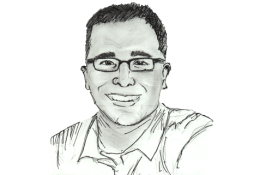 Life is only on Earth and not for long,” actress Kirsten Dunst laments in the film “Melancholia” before a rouge planet annihilates our world in a spectacular collision seen by no one.
Life is only on Earth and not for long,” actress Kirsten Dunst laments in the film “Melancholia” before a rouge planet annihilates our world in a spectacular collision seen by no one.
I remember a specific point in time when I looked up at the night sky through the passenger window of my father’s powder blue Geo Metro and watched my own eyes grow wide in the reflection with epiphany. Suddenly, an idea I had heard time and time again in grade school science clicked, and I realized just what it meant to be so small in a universe so big. My nine-year-old self spent the next two weeks holding on to every ledge and railing available to avoid being launched into space.
In that instance, education fulfilled its raison d’etre. As a product of the public school system, I had internalized knowledge and applied it to the world around me.
Ten years later, members of my generation have an enormous body of information under their belts; and we are nowhere close to satiated. Yet I do not think I am the only one who often wonders how we are supposed to tie together the knowledge we’ve gained. Education requires definition.
What does an education mean — at Georgetown and across the country? The answer to this question is crucial because its consequences are so dire. Even more than ignorance, the wrong kind of education is one of the most dangerous things in the world. Knowledge is a burden transferred from our parents’ generation — it has a weight, and it comes with a price.
Education bids us struggle every day to come to terms with the unspeakable crimes humanity commits against itself, from Sparta to the Inquisition to Hiroshima and Nagasaki and beyond. With every passing year, we develop a more acute sense of the lonely chill that comes from understanding the limits of our biology and the uniqueness of the human condition, thrust upon us by intelligence, self-awareness and opposable thumbs.
When, as teenagers, we first looked into the abyss of human history that is war and tragedy, we simply closed the books and directed our attention elsewhere. Yet something within us felt different. It was not the void that changed.
Childhood innocence is fragile, and we lose it just as much from our sins and the sins of others as we do from the recognition that the monsters we fear are inside us. Education confronts us with the most unchecked aberrations, perverse usages and greedy misappropriations of our shared human faculty.
Our sense of security is ripped away by the cold, hard truth of human societies and the physical world with which they wrestle. Ignorance is indeed bliss, until and unless one of your differences earns you derision or expulsion from a closed society.
Do not interpret this column as advocating for ignorance. Rather, I argue that education must put something in the place of the innocence it stripped away.
Education must not produce empty shells of post-modern men and women migrating between the twin fates of spiraling disillusionment and the totalitarian temptation of political ideology. Skepticism and critical thinking skills are important elements of a well-honed mind, but to leave us with those traits alone is to commit a cruel omission.
Education in the truest sense must teach us to believe — believe that something in us connects us to something bigger than ourselves. Belief can take many forms: religious, spiritual, philosophical and so forth. Students must be encouraged to investigate and discover those personal values that will keep them rooted to the ground as humanity hurtles through space and time.
Based on oft-quoted Jesuit values, this is the kind of education Georgetown has the potential to bring into the 21st century. Properly advertised and communicated to prospective matriculates, the Hilltop can become a place where students gather to engage in a truly holistic model of education. As current students, we ought to demand this model both for ourselves and for the broken U.S. public education system that so desperately needs reform in the place of platitudes and thoughtless legislation.
Accumulated knowledge means we can look into the stars at night and see them for what they are. Philosophy, faith and personal values, developed over the course of a lifetime, allow us to imagine what could be of the world. Education also instructs us what humanity is capable of — it is belief that teaches us that good will win out in the end.
Nate Tisa is a junior in the School of Foreign Service. He is speaker of the GUSA senate. CONTEMPLATION IN ACTION appears every other Friday.














